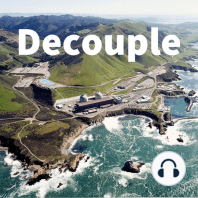47 min listen
Is China the Future of Nuclear Energy? feat. Francois Morin
FromDecouple
ratings:
Length:
82 minutes
Released:
Mar 20, 2021
Format:
Podcast episode
Description
China is currently 3rd in the world in Nuclear Energy capacity with ambitious plans to have the most reactors in the world by 2030. The Tsinghua climate plan calls for a 7-fold increase by 2050. Is China on the verge of a historic moment like the French Messmer plan, which saw France accidentally decarbonize by nuclearizing its grid in 15 years while electrifying a significant amount of heating and rail transport? The answer is a very complex "No."
At great expense in a time of post-civil war, crushing agrarian poverty and "great leap forward" economic mismanagement, China managed to join the nuclear weapons club in 1964. It was, however, very late to develop power reactors, with its first coming online only in 1991. Since then, China has imported many different turnkey projects from Europe, the USA, Canada, Russia while also developing its own indigenous designs culminating in the Hualong 1.
For a variety of pragmatic reasons, including the transport and air pollution externalities of coal and the ability to make nuclear cheap and profitable by very low-interest financing, nuclear is on the rise in China. However, coal use is still rising, as is energy demand, with data centre and 5G infrastructure expected to use as much energy as is currently produced by the entire Chinese nuclear fleet.
I am joined by Francois Morin, the China Director of the World Nuclear Association, to discuss the fascinating past, present, and future of nuclear energy in China.
At great expense in a time of post-civil war, crushing agrarian poverty and "great leap forward" economic mismanagement, China managed to join the nuclear weapons club in 1964. It was, however, very late to develop power reactors, with its first coming online only in 1991. Since then, China has imported many different turnkey projects from Europe, the USA, Canada, Russia while also developing its own indigenous designs culminating in the Hualong 1.
For a variety of pragmatic reasons, including the transport and air pollution externalities of coal and the ability to make nuclear cheap and profitable by very low-interest financing, nuclear is on the rise in China. However, coal use is still rising, as is energy demand, with data centre and 5G infrastructure expected to use as much energy as is currently produced by the entire Chinese nuclear fleet.
I am joined by Francois Morin, the China Director of the World Nuclear Association, to discuss the fascinating past, present, and future of nuclear energy in China.
Released:
Mar 20, 2021
Format:
Podcast episode
Titles in the series (100)
Nuclear Accidents & the Scientific Consensus feat. Gerry Thomas by Decouple
